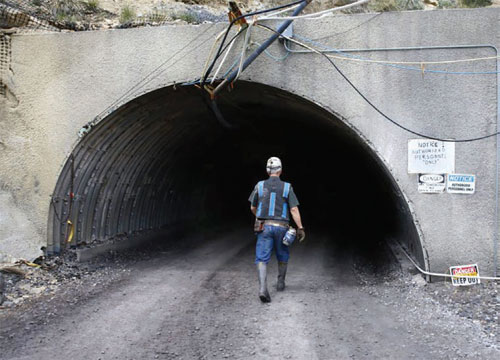By John Rogers
U.S. Assistant Secretary of the Interior Joe Balash has declared, “The war on coal is over.”
The pronouncement came following the recent Bureau of Land Management approval of two mining projects in Utah. The Department of the Interior announced that the $12.3-million Alton Coal Tract coal lease in Kane County and two coal lease modification proposals for the SUFCO Mine in Sevier County have been given the green light.{mprestriction ids="1,3"} The SUFCO Mine approval will extend the life of the existing mine by up to five years, the BLM said.
“In coal towns across this country, the American dream is alive and well,” Balash said.
“Through the continued approval of coal lease applications and modifications, the BLM has been able to support the success of coal development on federal lands, including the Alton and SUFCO coal mines,” the Interior Department said in a press statement. Secretarial Order 3348 made these actions possible by overturning the 2016 moratorium on all new coal leases on federal land, enacted at the end of the Obama administration. “The projects approved today will help foster Utah’s continued economic expansion through access to premier natural resources in the most efficient and responsible manner possible,” the statement said.
“American coal jobs matter,” said acting U.S. Secretary of the Interior David Bernhardt. “Coal production on federal lands provides nearly 40 percent of our nation’s coal. By approving these projects today, we will ensure that these mines are operational for years to come, providing well-paying jobs and affordable energy to the people of Utah.”
The SUFCO underground mine currently produces about 5 million to 6 million tons of coal annually, according to the industry website Mining Technology. It has been producing coal since 1941.
In November, the BLM Utah state office held a competitive sale of federal coal covering 2,114 acres 30 miles south of Panguitch near Alton. The tract contains about 40.9 million tons of in-place coal and an estimated 30.8 million tons of recoverable coal. Alton Coal Development’s $12.3 million bid was accepted by the agency and the recent approval allows the company to begin mining.
Utah’s Republican members of the U.S. congressional delegation applauded the new approvals. “The previous administration tried to kill coal production in Utah but this administration is committed to bringing the industry back,” said Sen. Mike Lee. “That’s why coal production in Utah increased in 2017 for the first time in three years. These two new coal projects are a huge win for Utah jobs, Utah consumers and the Utah economy.”
“This lease agreement will bring jobs and generate revenue to support the local economy in Kane and Garfield counties, while also protecting our natural resources,” said Sen. Mitt Romney. “Responsible energy development is important to Utah’s energy industry and rural economies, and I appreciate the cooperative efforts of the Bureau of Land Management and community partners to bring this project to fruition.”
“The approval of new leases on federal lands in Utah reiterates that coal will remain a staple of power production in our country, and an important economic driver for local communities,” said Rep. Rob Bishop. “Not only will this coal contribute to our nation’s baseload power supply, it will provide nearly 500 direct and indirect Utah jobs and help fund education. I commend the department for ensuring our nation’s federal lands are utilized in meaningful ways that contribute to our nation’s energy security.”
“Alton Coal is an economic engine that provides good-paying jobs that benefit the entire region,” said Rep. Chris Stewart. “This lease is a big win for my constituents. It will allow for additional growth and create more jobs that can support families year-round. I’m grateful for the leadership of acting Secretary Bernhardt on this issue.”
“I am glad to hear about this lease, which will bring new jobs and opportunities to southern Utah,” said Rep. John Curtis. “I look forward to working with acting Secretary Bernhardt, and the administration more broadly, on policies that ensure a safe and reliable energy system for all Americans.”
The coal industry on public lands in Utah contributed $748 million in total economic output in fiscal year 2017, according to figures from the University of Utah Bureau of Economic and Business Research.{/mprestriction}








